

The Big Religion Comparison Chart: Compare World Religions. The Story of God: God of The Gaps (BBC) Flying Spaghetti Monster. The Flying Spaghetti Monster (FSM) is the deity of the Church of the Flying Spaghetti Monster or Pastafarianism, a movement that promotes a light-hearted view of religion and opposes the teaching of intelligent design and creationism in public schools.[3] Although adherents describe Pastafarianism as a genuine religion,[3] it is generally seen by the media as a parody religion.[4][5] The "Flying Spaghetti Monster" was first described in a satirical open letter written by Bobby Henderson in 2005 to protest the Kansas State Board of Education decision to permit teaching intelligent design as an alternative to evolution in public school science classes.[6] In that letter, Henderson satirized creationist ideas by professing his belief that whenever a scientist carbon-dates an object, a supernatural creator that closely resembles spaghetti and meatballs is there "changing the results with His Noodly Appendage".
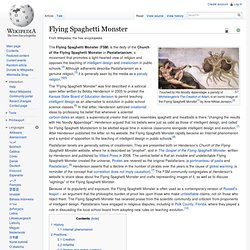
History Internet phenomenon Positions Creation Afterlife. Can it be rational for the religious to be non-rational? Pope Benedict XVI delivers his Christmas Day message from the balcony of St Peter's Basilica.
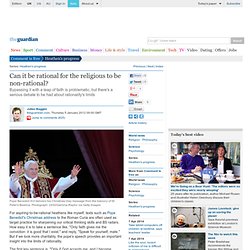
Photograph: 2430/Gamma-Rapho via Getty Images For aspiring-to-be-rational heathens like myself, texts such as Pope Benedict's Christmas address to the Roman Curia are often used as target practice for sharpening our critical thinking skills and BS radars. How easy it is to take a sentence like, "Only faith gives me the conviction: it is good that I exist," and reply, "Speak for yourself, mate. " But if we look more charitably, the pope's speech provides an important insight into the limits of rationality. The first key sentence is, "Only if God accepts me, and I become convinced of this, do I know definitively: it is good that I exist. " This leads to the second key sentence: "Where doubt over God becomes prevalent, then doubt over humanity follows inevitably. " Here's where it gets interesting. Return to the pope and his message becomes more interesting. But this might just be too quick.
Twelve Steps to a Compassionate Life – review. A nun gives food to a Mongolian orphan at a soup kitchen in Ulan Bator.
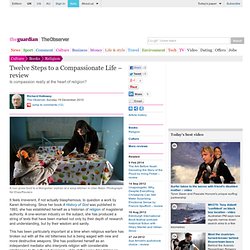
Photograph: Nir Elias/Reuters It feels irreverent, if not actually blasphemous, to question a work by Karen Armstrong. Since her book A History of God was published in 1993, she has established herself as a historian of religion of magisterial authority. A one-woman industry on the subject, she has produced a string of texts that have been marked not only by their depth of research and understanding, but by their wisdom and sanity. This has been particularly important at a time when religious warfare has broken out with all the old bitterness but is being waged with new and more destructive weapons.
If we can talk about an Armstrong project, there seem to be two main planks in its platform, both of them built solidly into her new book. The same would be true of the myth of the Garden of Eden, a story not about an aboriginal couple who pinched an apple, but about the enduring existence of human discontent. Gretta Vosper on spirituality vs. religion, prayer as placebo, and how to become an agent for change. Gretta Vosper has been in the spotlight since founding the Canadian Centre for Progressive Christianity in 2004.
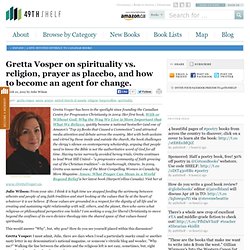
Her first book, With or Without God: Why the Way We Live is More Important that What We Believe, quickly became a national bestseller (and one of Amazon's "Top 25 Books that Caused a Commotion") and attracted media attention and debate across the country. Met with both acclaim and vitriol by those inside and outside the church, the book challenges the clergy’s silence on contemporary scholarship, arguing that people need to know the Bible is not the authoritative word of God for all time. Having twice narrowly avoided heresy trials, Gretta continues to lead West Hill United—"a progressive community of faith growing out of the Christian tradition"—in Scarborough, Ontario. In 2009, Gretta was named one of the Most Compelling Women in Canada by More Magazine.
Religion & Brain: Belief Decreases With Analytical Thinking, Study Shows. Many people with religious convictions feel that their faith is rock solid.
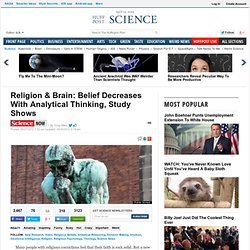
But a new study finds that prompting people to engage in analytical thinking can cause their religious beliefs to waver, if only a little. Researchers say the findings have potentially significant implications for understanding the cognitive underpinnings of religion. Psychologists often carve thinking into two broad categories: intuitive thinking, which is fast and effortless (instantly knowing whether someone is angry or sad from the look on her face, for example); and analytic thinking, which is slower and more deliberate (and used for solving math problems and other tricky tasks). Both kinds of thinking have their strengths and weaknesses, and they often seem to interfere with one another. One example comes from a study by neuroscientist and philosopher Joshua Greene and colleagues at Harvard University, published last September in the Journal of Experimental Psychology. Also on HuffPost: HolyBooks.com – download free ebooks.